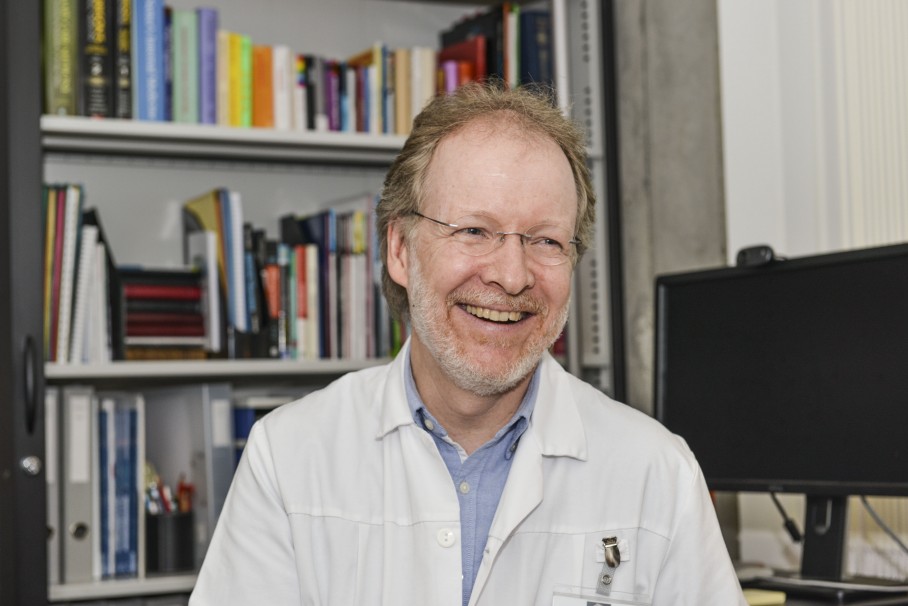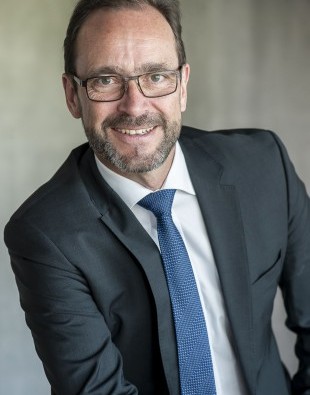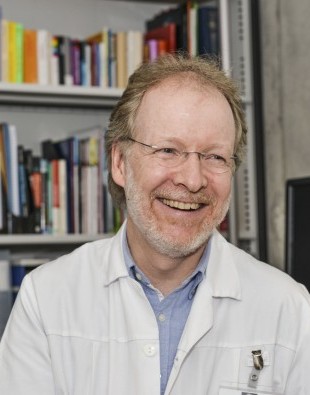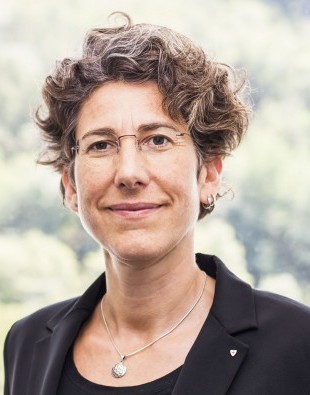
"Diversity is an enrichment and a growing reality."
Jan. 2018Equality of opportunity
Interview with Patrick Bodenmann. Equality of opportunity in hospitals does not mean providing a "one size fi ts all" treatment but one tailored to a patient's individual requirements, i.e. treatment that meets the needs of the particular health problem and the particular patient. Patrick Bodenmann is familiar with this important topic, both from a theoretical and practical point of view: as university professor, as co-founder of the Swiss Hospitals for Equity, and as head of a polyclinic at the University Hospital Lausanne.
spectra: Professor Bodenmann, in your capacity as physician and head of the Center for Vulnerable Populations at Lausanne’s University Medical Outpatient Clinic, your work focuses on disadvantaged sectors of the population. What interests you about this field?
Patrick Bodenmann: It’s a desire to combat treatment inequalities and promote equality of health-care. If we tailor patient management to the specific needs of each individual, we’re being equitable, even if we don’t apply absolutely the same approach to everyone.
"Some patients may certainly speak French, but their poor health literacy prevents them from understanding everything the doctor says."
Woher kommt Ihr Engagement für dieses Anliegen?
Ich denke, es ist die persönliche Biografie, die meine Kollegen und mich dahin geführt hat. Bereits als Medizinstudent interessierte ich mich für benachteiligte Personen. Dann arbeitete ich in Entwicklungsländern. So wurde ich für diese Fragen zusehends sensibilisiert. In unteren sozialen Schichten ist es viel schwieriger, sich Zugang zu einer qualitativ guten Gesundheitsversorgung zu verschaffen. Die PMU ist ein Ort, wo ich mich für Verbesserungen einsetzen und Lösungsansätze auf lokaler, regionaler und nationaler Ebene einbringen kann.
Who, in your experience, are the people particularly affected by this inequality?
Such "social health inequalities" concern those who are at risk of not benefiting from high-quality health-care because they belong to specific population groups. Twenty or so years ago, those affected were mainly involuntary migrants, i.e. asylum seekers or people without documents or of no fixed residence status. Immigration grew rapidly in the 2015–2016 period and it persists – though for various reasons at a lower level. Three days ago, on the occasion of a congress in Ticino, I made a detour to Chiasso, where I saw that migratory pressures could start growing again very rapidly.
Among Swiss nationals, the problem receives less media attention, but poverty exists. In the canton of Vaud, between 7 and 8 percent of the population live below the absolute poverty line. Studies show that 10 to 15 percent of people living in the French-speaking cantons have, for financial reasons, done without health-care in the previous few months. Then there’s the more subtle problem of communication. Some patients may certainly speak French, but their poor health literacy prevents them from understanding everything the doctor or nurse says. Frequent users of emergency services are also a main focus of the risks and vulnerabilities, as are prison inmates, sexual minorities, people with special needs, etc.
"We need to start by exploiting existing opportunities and progressing from there."
What sort of problems do these people have in everyday life with regard to health-care?
They have problems at three levels. The first is inherent in the patients themselves, for instance communication, which depends on their mastery of the local language, their educational level and their skills. Then there’s the health system, for example hospital signage, which helps – or fails to help – each patient to find their way around. Lastly, there are the staff and the differences in their professional skills, know-how, soft skills and general understanding.
What problems do you encounter most frequently in the treatment of migrants?
Firstly, infectious diseases, on account of their prevalence in the countries of origin, for instance tuberculosis, a "classic"; or, less frequently diagnosed here, schistosomiasis, Chagas' disease, etc. Secondly, chronic non-communicable diseases such as diabetes, hypercholesterolemia, obesity, hypertension. We're talking about epidemiological transition. Third factor, ageing. How do we diagnose cognitive difficulties, what tools have been validated in the cultures of origin? The number of migrants aged over 65 has doubled in a decade. The fourth factor, unfortunately prominent on account of its scale, concerns mental health (post-traumatic stress, depression, anxiety, etc.). We primary care physicians have to react before a situation becomes too acute or permanently chronic. Fifthly: the ubiquitous diseases that can affect everyone: when a veiled Moroccan patient suffers from chronic intestinal problems – it could be a case of malabsorption syndrome unrelated to her migration background.
What characterises these problems the most is the complexity that we have to deal with in our everyday work.
What characterises these problems the most is the complexity that we have to deal with in our everyday work. What's more, if these cases develop complications, they can generate a sense of frustration and dissatisfaction among us. In our institution, we study the vulnerability factors that add complexity to a consultation: according to our hypothesis, they are associated with both the patients and the medical professionals. At any rate, the complexity accurately epitomises situations which are marked by the patients' uncertainty, vulnerability, social issues, residence status and personal experience, and by the risk of medical staff stereotyping and stigmatising them.
Does this complexity delay diagnosis among vulnerable populations?
The purely clinical work is preceded by a parade of social, statutory and communication problems. Well, given the complexity, there is a risk that the findings will match the supposed diagnosis rather less closely than if we were dealing with a patient on whom we could exercise our primary skills directly. We have to redouble our efforts.
"Communication is a major systemic problem."
How would you define equality of opportunities in healthcare? What implications does it have in practice?
I feel this term is more historical than adapted to our reality. In 2004, at the Consensus Conference on Migrant Friendly Hospitals in Amsterdam, Switzerland was very much present, particularly in the person of Peter Saladin, although it was not officially part of the network. It's from there that I remember the concept of equality of opportunity. If it's a social attitude, it is praiseworthy but not that realistic.
Health equity is more realistic. For instance, even if their health problems are similar, wheelchair users are likely to need additional assistance linked to mobility. That's not egalitarian, but it is equitable. The notion of iniquity refers to an immoral, unjust situation and therefore concerns social justice. The Migrant Friendly Hospitals network, set up after 2004, has become the Swiss Hospitals for Equity, a more apt label that encompasses all the population groups referred to above and therefore suits us very well.
Are there also any systemic problems that create inequalities?
Communication is a major systemic problem, particularly when patients don't speak one of our languages. This necessitates the involvement of community interpreters, either on site or by telephone. But little progress has been made in the question of funding, and without communication, we are unable to get on with our medical duties.
Then there's the low level of health literacy. Medical professionals and the healthcare system as a whole must face up to the fact that not everyone is able to understand 30-page brochures. In 2015, the FOPH drew up a nationwide progress report in the wake of a European survey (in which Switzerland did not figure). In Switzerland over 40 percent of the population have low levels of health literacy, so that they are unable to understand medical instructions.
And let's not forget people who are deaf or otherwise hearing-impaired, who need interpreters and information in sign language. So we're sometimes at a loss as to how to proceed.
There's another problem, more to do with the medical professionals: the complexity associated with these population groups can generate stigmatisation, stereotyping and emotions that undermine an empathy-based approach. This has been demonstrated over the last 25 years in studies conducted in the United States, where issues concerning race and ethnicity play a prominent role. To remedy this problem, we try to improve awareness of these different aspects at the training stage. The very nature of our clinical work prompts us to categorise symptoms, diagnoses and people.
Ist der Zeitmangel ebenfalls ein systemimmanentes Problem?
Dieser Aspekt hängt eher von der jeweiligen Gesundheitseinrichtung ab, ist aber ganz wichtig. Es braucht Zeit, um zuzuhören und verstanden zu werden. Würde die Dauer der ersten Konsultation gekürzt, müsste man in kleineren Schritten arbeiten mit dem Risiko, dass sich der Gesundheitszustand in der Zwischenzeit verschlechtert.
In einem Universitätsspital haben wir die Möglichkeit, uns etwas mehr Zeit zu nehmen, weil die Ärztinnen und Ärzte ihren Beruf noch erlernen und weil wir mehr komplexe Fälle haben als eine Arztpraxis. Derzeit gibt es bei uns viele Lehrmittel und personelle Unterstützung, zum Beispiel durch Sozialarbeiter und erfahrene, gut qualifizierte Pflegende. Wir arbeiten auch interdisziplinärer. Zeitbegrenzungen für Konsultationen sind bedeutende Einschränkungen - wir müssten uns anpassen, falls die Konsultationen weiter limitiert werden.
«Es braucht nicht nur den Willen zu einer gerechten Gesundheitsversorgung, sondern auch eine Kultur der Chancengerechtigkeit, d.h. eine Kultur, die Qualitätsverfahren beinhaltet. Diese sind für die Qualität der Gesundheitsversorgung absolut unerlässlich.»
Would you say that an interpreter helps cut down costs?
Nationwide studies conducted by Dr Alexander Bischoff have shown that interpreters cost money at the time, and are on the expensive side. But we need to view these expenses in the context of quality of patient management, patient safety and any decision to conduct, or not to conduct, an additional examination.
Welches sind die wichtigsten Faktoren für das Gelingen von Verbesserungen?
Das Gesundheitswesen muss Instrumente zur Verfügung stellen, mit denen die Realität besser verstanden werden kann. Wir brauchen eine Datenbank, die administrative, finanzielle und auch soziale Parameter erfasst. Ein grosses Schweizer Spital kann es sich nicht leisten, die Bedürfnisse bezüglich Verständigung zu ignorieren. Ein Team in Genf hat eine sehr sachdienliche Software eingeführt, dank der man genau weiss, welche Sprachen die Patientinnen und Patienten sprechen.
Ausserdem braucht es nicht nur den Willen zu einer gerechten Gesundheitsversorgung, sondern auch eine Kultur der Chancengerechtigkeit, d.h. eine Kultur, die Qualitätsverfahren beinhaltet. Diese sind für die Qualität der Gesundheitsversorgung absolut unerlässlich. Bei meinem Austausch mit nordamerikanischen Kollegen habe ich erfahren, dass sich dort die gesundheitlichen Ungleichheiten aus sozialen Gründen von einer Randerscheinung zu einem Massenphänomen entwickelt haben. Zu einer Problematik im Mittelpunkt des Interesses.
Für die Gesundheitsfachpersonen sind als Erfolgsfaktoren die Aus-, Weiter- und Fortbildung ganz wichtig, und zwar immer und überall.
Where do we start in order to improve the situation?
We need to start by exploiting existing opportunities and progressing from there. We can sometimes act at the health-care system level itself, or at the training level for doctors and nurses. And sometimes we need to look at quality management procedures. We work on different dossiers in parallel. As soon as there’s an opportunity, we take action. The deaf or hearing-impaired are a good example: the department of public health and the medical students have been mobilised, and we have been able to put a number of measures in place. This opportunity was not there three years ago.
Everything that comes under the heading of quality is essential. It may seem contradictory, but I’m a fervent defender of quality management procedures because they are of real benefi t to equality of opportunity within a health-care institution.
"Quality management procedures are of real benefi t to equality of opportunity within a health-care institution."
Where do the implementation difficulties lie?
In some parts of Switzerland, the approaches taken depend on one or two individuals. When they leave, everything comes to a halt. On the one hand, there is a need for a bottom-up approach, with people on the ground who want to bring about change in relation to procedure, patient management quality, approaches to prevention and health promotion, etc. On the other hand, we need top-down action, i.e. decision makers – health & social action services, public health departments – who enable us to progress by taking certain decisions themselves.
When these forces are combined, we can take action that focuses on the long term. We're fortunate: our political decision makers, our public health department and our faculty of biology and medicine - very important - decide and support us. If this dual approach fails, the situation becomes much more difficult.
So you're satisfied with your situation here in the Canton of Vaud?
Yes, we've achieved some interesting things. Our role here is to stimulate emulation among other centres in Switzerland, particularly through the network of Swiss Hospitals for Equity. I travelled last week to Ticino with this in mind – so that we can share tools, material and thinking. But we mustn't stop at the national level. We have to go beyond that, comparing our experience, benefiting mutually, swapping information. What counts ultimately and most importantly is that the fruit of our thinking and our shared experience must benefit the patient.
Wie erklären Sie sich, dass diese Ideen in der Westschweiz besser entwickelt sind als in der Deutschschweiz?
Im Netzwerk Swiss Hospitals for Equity gibt es durchaus auch interessante Initiativen von Deutschschweizer Spitälern, zum Beispiel Entwicklungs- und Forschungsprojekte am Universitätsspital Basel oder den nächsten Kongress am Universitätsspital Bern. Die Ideen werden aufgegriffen und weitergegeben, das ist ein mittel- oder langfristiger Prozess, der manchmal etwas mehr Zeit beansprucht. Bei uns in der Romandie wird zum richtigen Zeitpunkt mit vereinten Kräften gearbeitet, was ein Vorwärtskommen erleichtert. Das ist nicht überall der Fall.
Man darf auch die Stärke der Universitäten und ihre Verantwortung bezüglich sozialer Medizin nicht vergessen. Die nordamerikanischen Universitäten werden übrigens in Bezug auf ihr soziales Engagement bewertet. Es wäre interessant, dasselbe in der Schweiz zu tun.
Auf jeden Fall entwickeln sich die Dinge auch in der Deutschschweiz und im Tessin weiter, was mich in der Idee bestärkt, dass wir uns weiterhin gegenseitig helfen und vernetzt arbeiten müssen.
Die nordamerikanischen Universitäten werden übrigens in Bezug auf ihr soziales Engagement bewertet. Es wäre interessant, dasselbe in der Schweiz zu tun.
Is it necessary to raise the awareness of vulnerable groups to healthy behaviour (balanced diet, sufficient physical activity, moderation in the use of tobacco and alcohol)?
Yes, that's absolutely necessary and normal. Take diabetes for example The Canton of Vaud drew up a cantonal plan focusing on this disease. Then a group expressed a particular interest in the management of diabetes in the populations most affected. It's an excellent approach: even though this condition is well understood, it's already difficult enough to manage in patients who can communicate with ease, have the same points of reference and the same explanation of the disease as you do. So yes, this approach is all the more important when applied to more vulnerable populations such as involuntary migrants or to Swiss nationals who do without treatment for financial reasons.
Twelve years ago, the president of H+, Peter Saladin, suggested that good management of diversity would have to become the norm in businesses. Are we anywhere near this goal today?
Management of diversity is just as important in our patients as in our healthcare teams. In our outpatient clinic, diversity is a reality that is both a product of specific efforts and also a reflection of our society. If there is such a thing as a diversity laboratory anywhere in the world, then it is Switzerland, with its four national languages and three cultural regions. The fact is that management of the same health problem in a Ticino, German Swiss or French Swiss patient varies in many respects because the problem is not perceived in the same way. I don’t know whether we’ve arrived at an ideal balance. Perhaps there’s a need for more studies on the subject. In my view, diversity is an enrichment and a growing reality. The health-care system has to work with this reality and make the most of the benefits it offers, which in my experience far outweigh the difficulties.
"I really hope that we, the medical professionals, will never become used to the intolerable and the unspeakable."
What are your wishes for the future?
First, I would like students to continue showing an interest in these topics. This is important because they're going to be confronted with this type of problem and therefore we'll feel encouraged in our efforts.
I also hope that the decision-makers will always allocate part of the available funds to research into social health inequalities. Admittedly, some projects are already being funded in the framework of the national research programmes, but this will have to continue. My third wish is that the Chair of Medicine for Vulnerable Populations at the Faculty of Biology and Medicine of the University of Lausanne should not remain the only one of its kind. Such posts must be created at other universities. The momentum is great, but additional people and structures must follow at the university level.
Finally, I really hope that we, the medical professionals, will never become used to the intolerable and the unspeakable, to what is genuinely a problem. While we must go on working as clinicians, teachers and researchers, we must also fulfil our role of spokesperson for the patient.
Haben Sie denn nie genug von diesen komplizierten Patientinnen und Patienten?
Als ich meine Arztzulassung erhielt, habe ich mich verpflichtet, alle Patientinnen und Patienten zu versorgen. Die Ärztinnen und Ärzte, mit denen ich eng zusammenarbeite, teilen diese Auffassung.
Man muss jedoch auch daran denken, zwischendurch neue Energie zu tanken, und sich überlegen, wie man der Zermürbung und Abstumpfung - sozusagen der «Mitgefühlsmüdigkeit» - entgegenwirken kann.
Es stimmt, dass manche Patientinnen und Patienten uns je nach Beschwerden und Schwierigkeiten viel abverlangen, auch aus moralischer und psychologischer Sicht. Wir haben jedoch das Glück, von einer Fachperson für transkulturelle Psychiatrie unterstützt zu werden, die sich sowohl um die Patientinnen und Patienten als auch um das Personal kümmert. Zudem haben wir uns eingehend mit diesem Phänomen befasst und sind somit besser darauf vorbereitet.
Und schliesslich arbeite ich in einer Institution, die auf das Leben ausserhalb der Arbeit Rücksicht nimmt, auf das Wohl ihrer Mitarbeitenden bedacht ist und Teilzeitarbeit für Eltern ermöglicht.
Unsere Tätigkeit ist manchmal schmerzhaft, aber auch sehr sinnvoll.
Ich persönlich behandle Patientinnen und Patienten mit ganz unterschiedlichem Hintergrund - nicht nur Asylsuchende, Sans-Papiers oder Menschen in schwierigen finanziellen Verhältnissen.
So finde ich insgesamt ein Gleichgewicht. Befasst man sich mit einer solchen Thematik, muss man davon begeistert sein, und das bin ich. Unsere Tätigkeit ist manchmal schmerzhaft, aber auch sehr sinnvoll.
Our interviewee
Prof. Patrick Bodenmann is head of the Center for Vulnerable Populations. Now senior physician at Lausanne’s University Department of Ambulatory Care and Community Medicine (PMU), associated professor and Chair for Medecine for Vulnerable Populations at the Faculty of Biology and Medicine of the University of Lausanne, Dr Bodenmann studied internal medicine in Lausanne and then public health in London.




